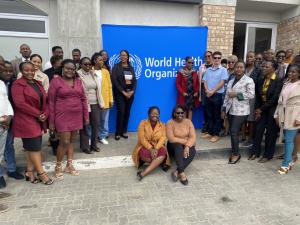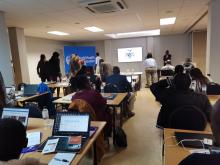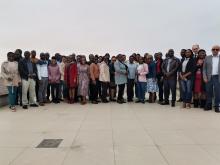Namibia received first training on prevention, management, and surveillance of Neglected Tropical Diseases
The Ministry of Health and Social Services trained f 60 health workers and partners from different sectors to strengthen the country’s capacity to prevent and control neglected tropical diseases (NTDs). The training was conducted on 24-28 October 2022 in Swakopmund.
The prevalence of NTDs in Namibia seems to be more pronounced in the northern regions with Kavango East and West and Zambezi regions carrying the highest burden. Although the country identified 8 (Schistosomiasis (SCH), Leprosy, Rabies, Trachoma, Scabies, Snakebite and Soil Transmitted Helminths (STH), Neurocysticercosis) of the 20 NTDs, Schistosomiasis and Soil Transmitted Helminths seems to be most prevalent with a prevalence rate of 9% and Kavango East and West being the highest at 18 % followed by Zambezi region at 16%.
Globally, WHO reports substantial progress in the fight against NTDs with forty-six countries having eliminated at least one NTD and, between 2015 and 2019, more than 1 billion people treated every year for one or more NTDs. In the period 2010 to 2020, the number of people requiring an NTD intervention was reduced by 600 million. Despite these milestones in many countries, more than 1.7 billion people still required treatment and care for NTDs in 2020.
Although Trachoma, Snake bite, Rabies and Scabies are actively reported through the DHIS2 and Integrated Disease Surveillance and Response in Namibia, the surveillance of NTDs is not robust to help the country monitor its progress towards elimination and eradication. This training intends to increase the country’s ownership and strengthen its capacity for surveillance, monitoring and evaluation of NTDs.
WHO has been working with the government of Namibia to increase efforts for the prevention and control of NTDs. These include the mapping of Schistosomiasis and STH in all regions except Khomas Region. In 2014 and 2018, WHO provided free Preventive Chemotherapy medicine which was followed by mass drug administration in 2015 and 2019 respectively. A National Strategy on the Elimination of NTDs is in draft and will be finalized during the two weeks training.
The response to NTDs is grounded on the principle of “leaving no one behind” and is vital to meeting the sustainable development goals. NTDs affects people from poor socio-economic background with limited access to safe water, proper sanitation and are in proximity with infectious vectors and animals. The stigma associated with NTDs coupled with limited knowledge at community level further impact timely access to treatment which contributes to the high mortality and morbidity associated with NTDs.
In her welcome remarks, Ms Philomena Ochurus, the Director of Health Information and Research in the Ministry of Health and Social Services expressed her appreciation for the training since it ‘will help us to strengthen our capacity to design appropriate strategies and interventions for the prevention, control and elimination of NTDs in line with the global roadmap for 2030’.
The training was facilitated by WHO technical staff from the Regional Office for Africa and Geneva, including Drs Abate BESHAH/ WHO AFRO, Denise MUPFASONI /WHO HQ and Albis Francesco /WHO HQ who were physically present during the training., The rest of the facilitation team supported the training online.
The training highlighted the epidemiological overview of NTDs at global, regional, and national levels. It further presented the global road map on NTDs and gave a detailed overview on each of the common NDTs in Namibia looking at risk factors, prevention, onset of disease and progression and treatment. Microplanning for NTDs programmes, drafting of NDT Master Plan and supplies, logistic and medicine for NTDs were included in the training. A National Plan on NDTs was drafted and is being reviewed for approval early 2023.


